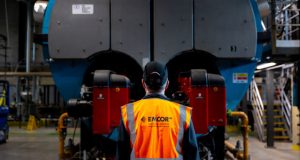New research by reuse specialist, Ramco, reveals UK firms have nearly £59 billion worth of capital tied up in working assets and equipment they no longer need.
As pressure mounts to find new ways to reduce the cost of doing business, Ramco is therefore urging businesses to contribute to the circular economy and find new homes for idle items, rather than letting them go to waste.
The new data shows 67 per cent of respondents – as many as 3.7 million UK businesses – admit they have good quality, working equipment they no longer need. The survey also revealed individual organisations could have an average of over £10,000 worth of assets sitting idle.
Conducted by Censuswide, Ramco’s research highlights 75 per cent of senior managers dislike the idea of unwanted equipment being scrapped or left to ruin in their business. Despite this, 59 per cent say they have disposed of working equipment by sending it to landfill in the last five years.
With demand for second-hand business assets at the highest point in Ramco’s 26 years of operation, founder and MD Neil Sanderson says the research findings are frustrating: “The second-hand market for consumer goods is booming through platforms like eBay, Vinted and the rise of fashion rental. It’s the same picture for the commercial second-hand market so to discover businesses have such huge capital tied up in good assets they no longer use when costs for doing business are rising, is hard to hear.”
Topping the list of second-hand business equipment sought by Ramco’s buyers are electrical goods, followed by industrial and plant machinery. And 66 per cent of businesses say they regularly seek to purchase second-hand equipment before looking to buy new.
Sanderson added: “It’s frustrating to see how much untapped potential there is when it comes to second-hand business goods. From catering equipment to plant machinery and vehicles, across the country there’s a mountain of good quality items being unused and left to ruin.
“As the cost of doing business spirals, we’re urging businesses to use this opportunity to review their assets and where they’re no longer needed, give them a new lease of life instead of letting them go to waste. It’s an opportunity to reduce an organisation’s carbon footprint, minimise storage costs and generate capital. None of us can afford to waste resources – for the planet and for profit.”
To help organisations see the potential in their unwanted equipment, Ramco has launched a new value finding tool to illustrate the carbon savings and financial return which can be generated by giving assets a new lease of life.
According to Pitney Bowes Parcel Shipping Index, worldwide parcel volume is likely to double in the next five years, with the UK showing the highest increase in carrier revenue of all 13 countries in the Index.
Alongside a huge uptake in the volume of parcel volume and spend, post pandemic, the adoption of hybrid working patterns means that FMs need to find ways to enable staff to book / host collaborative meetings in available workspaces and to find desk, office and parking spaces by utilising automation and data capture to enable site governance.
Yet a recent survey by FMJ in partnership with Pitney Bowes found that 20 per cent of recipients are still using manual paper-based visitor systems, which doesn’t fit with their top priority – to maintain a safe and operational environment.
This overwhelming reliance on paper-based systems is causing many respondents bottlenecks, resulting in a lack of efficiently in logging and tracking packages and people coming into the organisation.
In this webinar, Gary Abbott Director of Business Development and Stuart Bushaway, Head of Dealers Operations and FM Relationships at Pitney Bowes will outline the main findings of the two surveys and what this could mean for FMs, followed by a discussion, chaired by FMJ Editor Sara Bean with a panel of thought leaders into the solutions available to meet these challenges.
Register for the webinar here.





